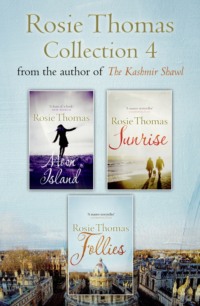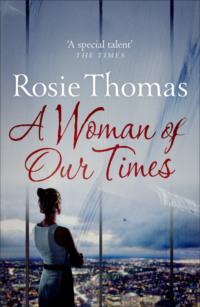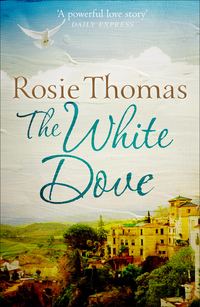
Полная версия
The Potter’s House
Xan laughed. It was a sound deep in his chest and she felt the vibration as he pulled her closer. He didn’t share her fears.
‘You were once so brave. My lone traveller, afraid of nothing in the world.’
He often teased her about this, that she had come to Halemni to be a wife and mother after having seen everything there was to see and done everything else there was to do.
‘It isn’t fear, exactly. I don’t want anything to change and yet the boys change all the time, and I suppose anxiety comes out of that.’
‘You can’t stop change,’ he murmured. Xan was sleepy, but he still ran his hand over the curve of her ribs, into the hollow of her waist and up the swell of her hips. Olivia breathed out and lay back. It was late and they had to be up very early, but it made no difference when he wanted her, as he did now. It hadn’t changed since the first time he saw her and wanted her, in Bangkok by the monsoon-swollen river. She was a thin, crop-haired, pale giantess then, all dangling legs and arms, among the tiny smooth Thais.
‘Don’t worry, I love you,’ he muttered as his hand slid between her thighs.
Christopher Cruickshank had walked down to the beach. He sat on the shingle now, smoking a last cigarette with his back to the lapping water. The beach beds had all been taken into storage for the winter.
Only one or two lights showed in the tiers of houses. Left to itself, Megalo Chorio went to bed early. The tip of his cigarette glowed as Christopher gazed upwards. Immediately above the Georgiadises’ house was the dark hump of the little hill where he had taken the guests for their last morning’s painting. Beyond and behind that was a paler glimmer against the black sky. This was the limestone cliff, crowned by a ruined castle of the Knights of St John, that dominated Halemni bay and the beach and the harbour. And perched in the saddle of hillside that rose up to the bluff were outlines too square to be natural rock forms. Although they were all but invisible in the darkness, Christopher knew the shapes and the scenery so well that his mind’s eye supplied the image as clearly as if it had been bathed in sunshine. These were the ruined houses of Arhea Chorio, the old village. It had been abandoned a generation ago, when families moved down to the coast away from the hill farms to the tavernas and beach stands. Now the roofless houses disintegrated slowly into the heaps of stone from which they had been built.
Christopher liked the old village. When he had a free afternoon he would climb up there to spend an hour reading or sketching among the stones, with only the lizards and an occasional basking snake for company. Very few of the summer tourists ever bothered to make the hot scramble up there and for weeks at a time he was the only visitor. Now, as he smoked, he kept his eyes fixed on the ruins, or the view of them that his inner eye supplied. He felt an uneasiness at his back, coming off the water like a winter fog, and it was more comfortable to look up the hill at the old houses.
When he had finished his cigarette he threw the butt over his shoulder into the sea. He played with the idea of smoking another, but he was cold and the invisible fog breathed around him. He scrambled to his feet instead and crunched up the shingle. He rented a room in the main street and his bed was waiting for him.
It had been a long day, the end of a long season. He would stay on Halemni maybe another week, or two weeks, and then he would head north again for the winter.
Three
I am in Turkey, sitting on the sea coast and staring westwards.
I have almost forgotten why I am here, if there ever was a particular reason for coming. It doesn’t matter anyway. One place is much like another for the time being.
This is a skeleton of a hotel, pasted over with white concrete skin so that it looks smooth but brittle. There are big blind windows and flimsy balconies like pouches under a drunkard’s eyes.
I sleep as much as I can, in my hotel bedroom, behind closed curtains. And when I can no longer sleep I sit on the balcony under the shade of a parasol. Even though it is late in the season I don’t like the sun to touch my skin and my pale eyes water in so much harsh white light. I keep my sunglasses in place and try to read, and the time slowly passes.
I can’t pinpoint exactly when Dunollie Mansions stopped feeling like a refuge and became instead a place that I wanted to get away from. It was probably not very long after the dinner when Peter met Lisa Kirk for the first time.
He was busy in the weeks immediately after that night, working on a job that demanded longer hours and even more concentration than usual. He stayed late at the office, and seemed tired and distracted when he did come home. I should have interpreted the signs at once and spoken out about them, but the potential for that kind of conversation seemed already lost. Instead I tried hard to be less demanding, as if that might win his approval again. I embarked on some redecoration in the flat, and discussed colours and finishes with the painters. I went out looking for fabrics and spent time putting together colour boards for Peter’s approval.
‘Very nice,’ he said, pressing the rim of his glasses against the bridge of his nose with the tip of his finger, an indication of stress that I had learned to recognise long ago.
‘You like the green, then?’
‘Yes, if you do.’
I didn’t care about the green and I knew that he didn’t either.
Once or twice I had a cup of tea upstairs with Lisa in her flat.
There was no reason to refuse her invitations, nothing I could have identified except the thin squeak of hostility between us, and I was ready to think that that might be a product of my imagination, the murmur of my own madness. Peter apparently didn’t hear the sound, although he always had done so up until now and been able to take the right reassuring steps. He was too busy, or maybe he was simply tired of listening out for it.
Lisa didn’t choose to come again to my flat, Peter’s and mine, although I always invited her. We went upstairs instead.
Each time I saw her she seemed younger and warmer and more bursting with life. There were signs that she was making a home of Dunollie Mansions, but they were fairly limited ones – an armchair of steel and cowhide stood in the living room, with its paper and corrugated wrapping only partly removed; a patch of wall in the dark hallway had been experimentally striped with different paint colours.
‘What do you think?’ Lisa waved a hand as we passed on the way to the kitchen.
‘Pink?’
‘You’re right. Too sugary. Much.’ And then a sigh. ‘I’ll never have time to get this place together.’
We drank tea, sitting next to the big red refrigerator.
‘What’s happening about Baz and the girlfriend?’
She shrugged. ‘Idyll of delight, I suppose. I don’t care. Fuck ’em.’
Fuck my husband.
Was she doing it then, or did that come later?
There is someone at the door. Room service, with some meal I have ordered and will not eat.
The waiter is the one who always comes, day or night. He never seems to go off duty. When he takes the trays away he looks under the dish covers and sees that I have barely touched the food, and he sighs in reproach. He is very young, perhaps only fifteen or sixteen.
He puts the latest tray down on the low table, and makes a big show of displaying the food and unfurling the napkin for me.
‘Is good,’ he cajoles, ‘is very nice.’
I smile at him.
‘It looks delicious.’
‘I close the blinds?’
The light is fading over the sea. The sky is mushroom pink and the water is the same colour as the inside of an oyster shell.
‘No, leave them open. I like to look at the night.’
‘You need something else maybe?’
He hovers protectively and I am touched by his concern for me.
‘No, thank you.’
We wish each other goodnight.
The plan, if it was ever as conscious as that on my part, was for Selina and me to take this holiday together, a late-season two weeks on the Turkish coast in a pretty resort called Branc. Selina is an expert on hotels and she promises me that this one is good – Swiss-owned and run, but with a proper local feel to it.
‘The pool will be clean, the food close enough to authentic but without poisoning you.’
‘Why Turkey, Selina?’
She shrugged. ‘Why not? It’s fashionable. I’ve been everywhere else.’
Selina is currently between husbands. She has had three, or maybe four. I have known her since our modelling days and we have always kept in touch. It was her idea for us to make the trip.
‘Two women on their own, darling? Free and independent? We will have a fine time. You get out of London and you’ll feel better, believe me.’
I agreed that we should go. It was autumn again in London, the time last year that Lisa Kirk arrived, and she and Peter had now been living together for five months. I had started to wonder how much longer it would be before she was pregnant. The child Peter had always wanted.
I didn’t look forward to the holiday with much enthusiasm. When I thought about it at all I imagined it would be like the holidays my mother and I took together, after my father left us and went off to the Steps and Halves. Two women consoling each other, solicitous about sun cream and making sure that the other was comfortable, but still locked inside themselves with separate, clamorous voices in their ears. Maybe my mother would put it differently, if she were here, but I can still see the white triangle of her face and the misery in her eyes. Nothing I did ever rubbed it out for long. Of course not.
I probably do Selina a major injustice. We might well have had a wild time together, sitting on bar stools and drinking lurid cocktails, and then tripping off to discos to enjoy the startled attentions of the local Lotharios, in the absence of any younger prey, like a pair of giraffes displaced from the herd and yapped around by hyenas. The comparison would have drawn one of Selina’s yelps of laughter, before she flicked her lighter to another Marlboro.
In any case, she developed appendicitis four days before we were due to leave. I could have cancelled, but I had somehow got used to the idea of going to Turkey. I was even relieved at the thought of being able to do it alone, and not to have to keep up the pretence of being cheerful and energetic.
And so here I am.
I think about Peter, of course.
I prefer to remember the early days, when we were first married, when he used to drive us off to the country for weekends. We would go to little hotels in Suffolk or Devon, and lie in bed late and then take unambitious walks before coming back for tea, and drinks, and dinner. He was always trying to make me eat, and my evasions became a joke and then a kind of game between us.
‘Scone, darling? With some home-made jam and clotted cream?’
‘Just the cucumber, out of the sandwich, thank you.’
Peter belonged to the National Trust, for God’s sake. Not even my mother was a member. I thought this was funny and delightful, and if we didn’t go for a walk we would look up some local great house or ruined castle in the book and drive in the Jaguar to see it. I remember the smell of warm leather seats and brake fluid.
All of this felt very adult and secure, after the way I had been living – on and off planes, in and out of clothes and studios and hotel bedrooms, with men around me and in me whom I didn’t like or trust. Whereas I loved Peter and I trusted him absolutely, and he had the knack of making me feel loved in return. His love balanced out my guilt: it didn’t take it away, nothing could do that, it just counterweighted it and allowed me to function while still carrying the old burden around with me.
Peter had a conventional exterior, which he enjoyed cultivating, and inside this there was a quirky and clever man unlike anyone I had ever met before. I adored his cleverness, and the way he could weigh up people and problems quickly, and act on his observations and deductions. He was decisive where I was tentative, and generous where I was suspicious.
He was also the most sensuous man I had ever known. He loved food and fine wine and beautiful old cars, and pictures and made-to-measure suits and sex. He was the best lover. In bed, as I noticed the very first time, when he took off the shields of his spectacles there was the different soft face of an alternative, exotic Peter who belonged to me alone. I liked to smooth away the creases hooking his mouth with my thumbs. The stroking stretched the thin skin of his lips into a secret smile.
The food on the tray has gone cold. I prod at it a little, then cover the plates up again and slide the whole lot outside the door.
The sky is dark now. I stand at the window and look out at the line of lamps that line the hotel garden, and their broken reflection in the sea. After three days of gazing at it I am familiar with the view. The beach, with a row of beach beds and yellow mattresses under jaunty yellow parasols, now furled for the night, lies just beyond the garden wall. There is the water and a rim of tarnished silver where it meets the sand. Across the water are the donkey-brown humps of some nameless islands in the Greek Dodecanese. Nameless to me, that is – I asked my waiter their names, by sign language, and he rattled off something unintelligible with a dismissive shrug. There is no love lost between these people and the Greeks.
I am surprised by how close the islands lie to the Turkish mainland. Selina would probably have known. Selina would have maps and guidebooks, whereas I, of course, do not. That would be Peter’s role.
Always, I come back to him and how crippled I seem to be without him. And it is exactly because of this infirmity that he is no longer here. At some point – it must have been one day, maybe even one hour, or during the course of one single conversation – the fine balance tipped again, this time coming down against me. My needs from him became greater than his pleasure in me. I was too much to look after. Or maybe we just knew each other too well and the function buttons became worn with too much pressing so the connections didn’t work properly. Is that what always happens, with long-term partnerships?
Whatever you like. I don’t know.
I can’t go on feeling crippled by Peter’s absence or by the things that happened long before I met him, that much I do know after my days alone in this white hotel.
It ought to be possible to rub out history. To start again with a clean piece of paper, to write on it with a fresh and optimistic hand. That’s what I am doing here – making sense of what has happened and needing to work out what shape my life will take from now on. Selina’s absence means that I have to face the definitions and decisions alone and therefore properly.
So I have come out of my room. It is the fourth day and I have ventured down to the beach. With the full complement of yellow beach towels and robes and tubes of cream and magazines and paperback novels, of course. I have arranged all this and myself under a parasol, and I am flipping through Vogue when a shadow falls across the sand beside me. I look up to see my waiter, with a tray balanced on his shoulder. His shabby black shoes look incongruous so close to the lazy waves.
‘Madam, you come to the sun. I am happy. I bring you water and Italian coffee.’
There is a bottle of mineral water, and a cappuccino complete with chocolate powder.
‘Thank you.’
We smile at each other and he carefully arranges the drinks on the little table under the parasol.
‘What is your name?’ I ask him and he flushes a little. His skin is downy, hardly darkened with hair except on his top lip. He is probably even younger than I estimated.
‘Jim,’ he says. With a hard ‘J’ sound that sounds quite un-Turkish.
‘Like Jules et Jim?’ I ask fatuously.
‘I am not sure. But is a good name.’
‘Very good,’ I agree. Jim begins to back away, with the tray hanging flat by his side, and then hesitates. ‘An Inglis man is here. In Branc. Maybe you go for a boat ride?’
I must look desperate, or desperately miserable, or both. However, an English man is the last thing I am looking for.
Very firmly I say, ‘Thank you for thinking of it, but I don’t want to meet anyone here. No one at all, Jim.’ And I put the magazine up in front of my face to shut out the threat.
‘Okay. Good morning,’ he says and crunches away up the sand to the garden wall. I know I have been rude and that he is offended.
When I was first married I thought I might become an actress. Because of the way I looked then and some of the people I knew, I was given small – tiny – roles in a couple of films, but I wasn’t any good at it. And if I wound up hating the scrutiny of the photographer’s lens, I hated the film cameras even more. After a year or so I stopped trying and it was a relief. I didn’t have to earn money, because Peter provided for us both. I didn’t have to do anything except be married to Peter and have a family.
I have always had an ambivalent attitude to my body. Its length and skinniness enabled me to earn a living, but I hated the way people stared. I knew that they were only looking at it, and not into me in order to judge what they saw within, but the knowledge didn’t lessen my discomfort.
Peter used to say that they were looking because I was beautiful and I should be glad.
‘Plenty of women’, he said, ‘would change places with you.’
Up until then, at least, the legs and arms and breasts and backside had done what I wanted them to do. They moved for the camera and showed off whatever garment I was being paid to parade.
But I couldn’t get pregnant.
Not properly pregnant, so the baby stayed inside and grew. I had two miscarriages, very quickly, but the doctors were still optimistic and reassuring.
‘Don’t worry, it happens. You’ll have your family soon.’
Peter took me home and fed me and held me in his arms at night.
Then there was an ectopic pregnancy that ruptured one of the Fallopian tubes. This time there was anxiety. My chances of conceiving were diminished by fifty per cent. I was too thin, they told me, I was anxious and tense and probably depressed. All these things counted against us in our efforts to have a baby. I must relax.
Peter took me away on holiday, to Italy.
Soon I was pregnant yet again and it seemed that this time it might take. I got to four months and we told our friends and dared a celebration. But I miscarried again, in hospital, a sixteen-week boy. It was the last time. The last time I was even able to conceive.
I did hate my body after that, with a cold anger that made me want to mutilate myself. I needed a scapegoat and I turned my womb into one. This reaction was explicable, even logical, to myself and other people, and I used it as an acceptable shorthand.
I do not now believe, however, that my damned body was the real culprit.
It was myself, wherever that reality might be lodged and whatever form it might take. I think I never really wanted a baby because I was afraid of what might happen if I did have one. I was afraid of history, and tragedy.
This is our baby, we love him, he dies, it’s my fault.
That was the reasoning and so every time my body conceived, my mind poisoned it. Out the potential big tragedy came in a wash of blood, only another small tragedy as yet. Not even named.
If you think that’s crazy – believe me, so do I.
‘I will be the judge of that,’ Peter said mildly on the night we met, when I told him that I was mad. And he chose to bring in a verdict of sanity.
It was a strange mistake, for a clever and perceptive man who is usually so accurate in his judgements.
When it became obvious that we were not going to have children, I lodged myself in Dunollie Mansions like a hermit crab in its shell. I loved the screen of summer leaves and filigree winter twigs across the windows. I loved the thick walls and floors, and the almost dreamlike sense of seclusion, and the way Derek soft-footedly took care of the building. I liked the other quiet, discreet couples and the safety of the solid doors. There was no shock or violence or mayhem here, nor could I ever imagine anything of the sort disturbing our calm routines. I became a recluse.
We still gave dinner parties, of course, and went out to dinners in return, and to the opera and weekends in the country and on holidays, but I became an emotional solitary. Peter and I continued to look after each other and no doubt loved each other, but the woman he had taken home from the photographer’s party ceased to exist.
Obliterated by history.
Then came Lisa Kirk, with her red TARDIS and trendy furniture and the full heat of youth, smarting from Baz’s rejection and wishing for the baby she thought should have been hers. She saw in Peter Stafford exactly what I had seen myself, all those years before.
As I say, it was therefore only a matter of time.
Until Christmas, I reckon, give or take a week or two. I never quite got to the bottom of how it began. When I put the question to Peter he answered, shamefacedly, ‘We met for a drink, that’s all. She wanted some business advice.’
‘Where did you meet for a drink? How did it happen? Did she call you at the office and suggest this assignation?’
‘Cary, does it matter? Why do you need to know?’
‘Because I do,’ I snapped. But he wouldn’t tell me and in fact I didn’t need to know. This is how things unravel, that’s all. It’s nothing unusual. I had even watched my mother go through it, when my father ran off with Lesley.
It was quite early in the new year, this year that has now turned to October, and Peter and I were driving over to Fulham to have Sunday lunch with our friends Clive and Sally. It was one of those colourless London winter days when the sky and the river and even the buildings lack definition, and everything seems looming, as at the onset of seasickness. My handbag was at my feet, in the carpeted footwell of the current old car: an Alvis, silver-grey. Although Peter has now replaced it with a new BMW 5-series, no doubt at Lisa’s instigation.
I looked down for the handbag, intending to blow my nose or swallow a headache pill or something, and I saw a fragment under the seat mounting. Peter’s cars are always so impeccably looked after, it surprised me to see a piece of litter that might have been a sweet wrapper. I picked it up and looked down at it lying in the palm of my hand. Peter was occupied with the traffic at South Kensington.
What I had found was a little golden label, reading ‘Bag Shot by Lisa Kirk’.
Like a business card, but more eloquent. I put it in my pocket and said nothing.
The signs had been there for some time and now I was able to read them.
I began a horrible regime of espionage. Whenever Peter was working late, or when he telephoned to say he had an unexpected meeting or a new client to see, I would slip up the well-swept shallow stairs to Lisa’s door. I would ring the bell and then tap on the thick swimmy glass but – funnily enough – she was never at home either.
On the evenings when Peter did come home I would listen. I had never been able to hear Mrs Bobinski moving around, but then I had never tried to. Now I could suddenly hear the faint creak of floorboards, the vibrating bass of her music, the click of a door closing. Lisa at home.
‘What’s wrong?’ Peter asked.
I know, but I’m not ready to let you know that I know. That’s what’s wrong.
I’m on the beach again, another day. The sea is very flat, aluminium-coloured under a high, hazy sky. There is no breath of wind. A sailing boat crosses the mouth of the bay, the masts bare and the engines drumming. A shadow falls across my book.
A tall man with a white shirt and loose trousers, and creased Moroccan slippers with squashed pointed toes. I can see a narrow crescent of suntanned foot, between the leather slipper and where the cuff of his trousers dips over the heel.









